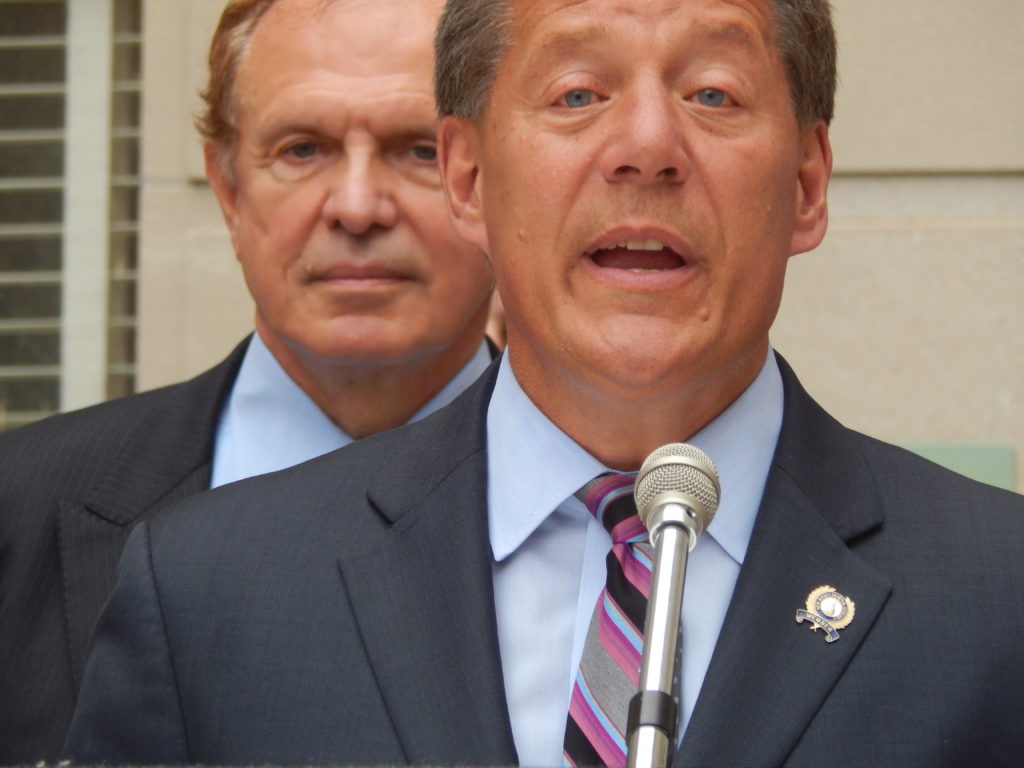Legislature Passes Enviro and Min Wage Bill

Legislature Passes Enviro and Min Wage Bill
The Assembly passed the following bills:
A2694(Mckeon/Pinkin)/ S1073(Smith) passed with a vote of 49-27. The bill authorizes municipalities, counties, and certain authorities to establish stormwater utilities.
“The biggest source of pollution we face is from stormwater runoff. This legislation is an important step forward to help clean up our waterways and protect us from flooding. The bill will allow towns to have a funding mechanism to establish stormwater utilities. Stormwater is a very serious problem that impacts our waterways and affects public health. This bill is a good start to help us reduce those problems and we need to continue to do more to clean up our combined sewer overflow because they are a health hazard,” said Jeff Tittel, Director of the New Jersey Sierra Club.
During periods of heavy rainfall the wastewater volume in a combined sewer system can exceed the capacity of the sewer system or treatment plant. Consequently, combined sewer systems are designed to overflow occasionally and discharge excess wastewater directly to nearby streams, rivers, or other water bodies. Dilapidated storm water systems exacerbate the problem by increasing the water in combined sewers and we need funding to reduce the amount of water in sewers during major storm events.
“We need to do more to clean up our combined sewer overflow because they are a health hazard, especially after heavy rain. Raw or impartially treated sewage runs during major storms are a huge concern. This could expose communities and the environment to serious contamination. This bill will go a long way to help municipalities to come with a plan to develop a program and infrastructure in place to help clean up non-point pollution and CSOs,” said Jeff Tittel, Director of the New Jersey Sierra Club.
A4392 (Burzichelli/Giblin)/ S2892(Sweeney) by a vote of 42-31-0. The legislation eliminates certain aviation fuel tax exemptions; provides funding for aviation capital projects. Both Assembly and Senate have passed the bill, it will now go to the Governor’s desk to sign.
“The aviation fuel tax bill has flown to Governor Murphy’s desk. We support the tax and believe that it should be put to use for a proper mass transport system that brings travelers and workers to the airport. For example, the Port Authority could extend the Newark Light Rail to Penn Station. We should be promoting public transportation to benefit our citizens and reduce our impact on climate change. This should include a variety of transit projects that help a variety of different communities,” said Jeff Tittel, Director of the New Jersey Sierra Club.“We hope Governor Murphy will sign the bill so that transit project can finally take off.”
A3075 (Quijano/Pinkin) passed with a vote of 74-1-1. The bill encourages development of zero-emission vehicle fueling and charging infrastructure in redevelopment projects.
“New Jersey needs to do more to increase our sale and use of electric vehicles. This bill is a good step, but we should be requiring redevelopment projects to have EV charging infrastructure. We need to create a charging network that allows people to drive through New Jersey without range anxiety. There are currently more than 20 fully electric and plug-in hybrid vehicles available at US dealerships and we want people to feel confident that they can purchase and EV and travel through New Jersey with it. We also need to develop the high-speed charging network and have utilities provide for charging stations in areas where the market won’t initially reach,” said Jeff Tittel. “We can see the benefits of clean air and clean jobs if we build a state-wide network of charging stations, create green jobs, save people money on gas, and reduce air pollution.”
A15 (Coughlin) Raises, over time, hourly minimum wage to $15.00. The bill passed with a vote 52-25. The legislation provides that, except for certain workers specified by the bill, the general minimum wage rate will be increased to $10.00 per hour on July 1, 2019, to $11.00 per hour on January 1, 2020, followed by $1.00 increases each year until the rate reaches a level of $15.00 per hour in 2024.
“We support this legislation that would raise the minimum wage in New Jersey. Nearly half of all workers across the country make less than $15 an hour. It is important to increase the minimum wage because it raises the standard of living and helps the environment. Raising minimum wage will help raise people’s standard of living. People who make more money live better lives, have better health and have a higher quality of life,” said Jeff Tittel, Director of the New Jersey Sierra Club.
The Senate passed the following bills:
S15 (Sweeney) Raises, over time, hourly minimum wage to $15.00 passed with a vote of 26-13. The bill provides that, except for certain workers specified by the bill, the general minimum wage rate will be increased to $10.00 per hour on July 1, 2019, to $11.00 per hour on January 1, 2020, followed by $1.00 increases each year until the rate reaches a level of $15.00 per hour in 2024.
“We support this legislation that would raise the minimum wage in New Jersey. Nearly half of all workers across the country make less than $15 an hour. It is important to increase the minimum wage because it raises the standard of living and helps the environment. Raising minimum wage will help raise people’s standard of living. People who make more money live better lives, have better health and have a higher quality of life,” said Jeff Tittel, Director of the New Jersey Sierra Club.





